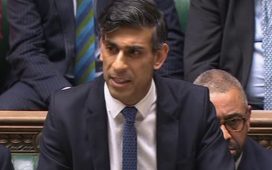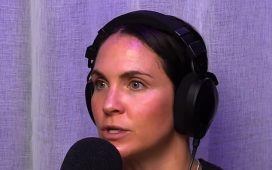Boris Johnson has boldly claimed hundreds of thousands fewer people are living in poverty than when the Tories took power.
The Tory leader contradicted his own social mobility watchdog to make the eyebrow-raising claim today at Prime Minister’s Questions.
Branding Keir Starmer’s complaints of poverty “completely wrong”, he made three key claims which don’t appear fully backed up by the facts.
First, he said: “Absolute poverty, relative poverty, have both declined under this Government.”
Second, he boasted: “There are hundreds of thousands, I think 400,000, fewer families living in poverty now than there were in 2010.”
And third, he claimed a report by the Social Mobility Commission – which said 600,000 more children are living in relative poverty than in 2012 – was actually talking about a possible future rise.

But his first claim doesn’t appear to be backed up at all by the government’s own figures.
The second has elements of truth, but we can’t find the exact 400,000 figure, and there are also lots of other figures showing poverty rising in other ways.
And the third is simply incorrect.
We’ve fact-checked the PM’s claims.
What did Keir Starmer say?

The PM made his claims in a clash with Labour leader Keir Starmer.
Sir Keir said he welcomed the Government’s U-turn on free school meals but that it is “just one step” to reducing child poverty.
He told MPs: “A report last week from the Government’s social mobility commission concluded that there are now 600,000 more children living in relative poverty than in 2012.
“The report went on to say child poverty rates are projected to increase to 5.2 million by 2022. What does the Prime Minister think caused that?”
Sir Keir Starmer also warned council leaders face a choice between “cutting core services or facing bankruptcy”. He added: “That will drive up poverty, something the Prime Minister says he doesn’t intend to do.
“Local councils have done everything asked of them in this crisis, the Government hasn’t. Will the Prime Minister take responsibility and actually do something?”
What did Boris Johnson say?

Mr Johnson replied: “I must say that he is completely wrong in what he says about poverty. Absolute poverty, relative poverty, have both declined under this Government.
“There are hundreds of thousands, I think 400,000, fewer families living in poverty now than there were in 2010.”
When questioned again about the Social Mobility Commission report, he told Sir Keir: “He is talking about what he calls an anticipated rise rather than a rise that has actually taken place.
“And a new concept is being introduced into our deliberations. What we’re talking about is what has actually happened, which is a reduction in poverty.”
Absolute and relative poverty have not both declined under the Tories
Despite what Boris Johnson said, absolute and relative poverty have not both declined uniformly under the Tories.
Some measures have risen and some have fallen. More detail on this further down this article.
We’re not sure where he got the 400,000 figure from
Boris Johnson said: “There are hundreds of thousands, I think 400,000, fewer families living in poverty now than there were in 2010.”
This doesn’t immediately match any of the figures below so it’s not immediately clear what figure he was referring to. There are many ways to measure poverty. We’ll ask No10.

(Image: Getty Images)
Boris Johnson was wrong when he claimed the Social Mobility Commission report was only a projection
Responding to the SMC report, Boris Johnson said: “He is talking about what he calls an anticipated rise rather than a rise that has actually taken place.
“A new concept is being introduced into our deliberations! What we’re talking about is what has actually happened, which is a reduction in poverty.”
But the Social Mobility Commission was clear it was talking about a rise that’s already happened – as well as a separate rise that’s predicted in future.
It said: “600,000 more children are now living in relative poverty than in 2012.
“This is projected to increase further due to benefit changes and coronavirus (COVID-19).”
So what HAS happened to poverty under the Tories?
The truth is poverty has both risen and fallen since 2010. But it depends what figures you use – and by many measures, it’s risen.
Government figures are measured in two ways – “absolute low income” and “relative low income” (or absolute and relative poverty for short).
Relative low income means those who are on less than 60% of the median income in the country at that time.
So while inequality means there will always be some in relative poverty, higher relative poverty suggests there is more inequality in society.
It’s measures both before and after housing costs – we’ll choose to look at it after housing costs, because they’re a crucial part of a family’s budget.
By all measures after housing costs, both the number and percentage of individuals and children in relative poverty have risen since 2010/11.
Absolute low income measures those who are on less than 60% of what the median income would have been in 2010/11, held constant in real terms.
So this looks less at how the poorest are keeping up with the Joneses, and more at how their living standards have improved (or not) over time.

(Image: Getty Images)
Between 2010/11 and 2018/19, after housing costs:
- The number of children in relative poverty has RISEN by 600,000 from 3.6m to 4.2m
- The number of children in absolute poverty has RISEN by 100,000 from 3.6m to 3.7m
- The number of individuals in relative poverty has RISEN by 1.5million from 13m to 14.5m
- The number of individuals in absolute poverty has FALLEN by 100,000 from 13m to 12.9m
- The number of working-age adults in relative poverty has RISEN by 600,000 from 7.8m to 8.4m
- The number of working-age adults in absolute poverty has FALLEN by 200,000 from 7.8m to 7.6m
- The number of children in “severe low income and material deprivation” has RISEN by 100,000, from 500,000 to 600,000
And when it comes to percentages:
- The percentage of children in “severe low income and material deprivation” has STAYED THE SAME at 4%













